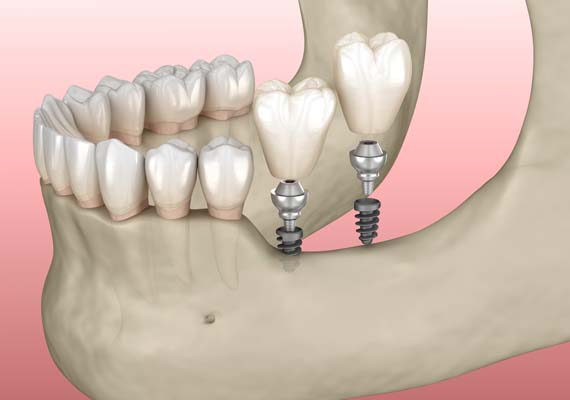Everything You Need to Know About a Dental Implant Restoration

A dental implant restoration is a great way to restore or replace teeth that are in bad shape or completely missing. Dentists provide different kinds of dental restorations to adult patients who want to improve their oral health and the way their smile appears. Dental implant restorations, in particular, are a bit more involved than other restorations. Ready to learn more?
Facts about dental implant restorations
Outlined below is everything that is important to know regarding dental implants and their restoration process.
What dental implant restorations are and how they work
A dental implant restoration is the process of restoring or replacing a badly damaged tooth through the placement of dental implants. Dental implants work to replace the tooth's structure, which helps provide support to the artificial tooth, also known as the prosthesis.
The dental implant restoration process
The first part of a dental implant restoration is for the fixture to be placed. The fixture is the more common name for the dental implant, which is put directly into the patient's jawbone beneath the gums. Fixtures replace the entire tooth's structure, which is the support for the entire tooth.
Once the fixture is placed, the patient should expect to undergo a period of recovery. The recovery process is important because it allows the implant to fuse with the natural bone through a process called osseointegration. Dental implants are the only type of restoration that allows for the preservation of natural bone, which is why it is a great option to consider.
After a few months of osseointegration, the patient can return to their dentist for the abutment placement. The abutment acts as the attachment piece that connects the implant to the prosthesis. Abutments are extremely small metal pieces that sit at the gum line. They are made of metal and tend to be circular in shape.
Lastly, the patient can undergo the placement of the prosthesis, also known as an artificial tooth. When a single dental implant restoration takes place, the general dentist will typically recommend a dental crown. Dental crowns are a great option for complementing the implant because they are strong and extremely natural-looking. In the case of multiple dental implant restorations, dentures may be a better option.
Things to note
When a dental implant restoration is being considered, it is important to be aware of the commitment. The entire process requires time and patience to ensure that the results are positive. Additionally, there is a chance of soreness and discomfort, which is typically managed by the general dentist. Being aware of what to expect can be helpful when considering the treatment.
Learn more today!
Getting familiar with how the dental implant restoration process works is a great idea, especially when considering the treatment. Any questions or concerns about the process or how it works should be addressed by a general dentist. Reach out today to learn more or to get started!
Request an appointment here: https://pearlcity.diamondheaddentalcare.com or call Diamond Head Dental Care at (808) 214-9287 for an appointment in our Pearl City office.
Check out what others are saying about our dental services on Yelp: Dental Implant Restoration in Pearl City, HI.
Recent Posts
Interested in a smile makeover? Many individuals are considering smile makeover procedures to improve the way their smile appears, which includes both the teeth and gums. There are a number of cosmetic dentistry procedures that can be used during the smile makeover process to enhance one's smile, ranging from tooth replacement to dental restorations. Read…
Many things go into good preventative dental care. One of the most important is brushing your teeth, but it's not something that people always do correctly. Today, we will talk about brushing your teeth correctly and why it's so crucial in preventative dental care.First, you need to use an actual toothbrush. There are many options…
Preventative dental care has long been the focus of dentists and patients alike. Taking proactive steps to protect your teeth and gums not only helps you prevent tooth decay and gum disease but can also decrease your risk of developing other illnesses such as heart disease, stroke, cancer, and diabetes. Here’s how oral health affects…
Preventative dental care is important for optimal oral health. It prevents bad breath, oral disease, tooth loss, among others.The enamel is the outermost part of the tooth. It is a white visible part above the gum. It is the part seen when you smile. The enamel is also the strongest layer of the tooth. It…


